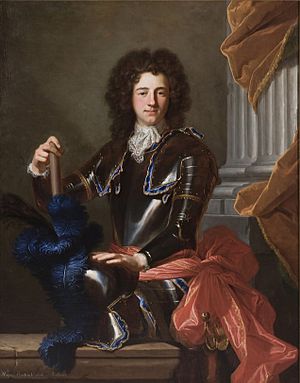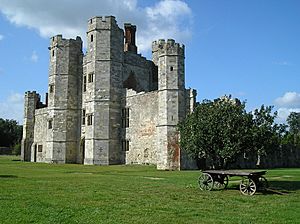Henry Bentinck, 1st Duke of Portland facts for kids
Quick facts for kids
The Duke of Portland
|
|
|---|---|

A 1699 portrait of Bentinck
|
|
| Member of Parliament for Southampton | |
| In office 1705–1708 |
|
| Member of Parliament for Hampshire | |
| In office 1708–1709 |
|
| Governor of Jamaica | |
| In office 1721–1726 |
|
| Personal details | |
| Born | 17 March 1682 |
| Died | 4 July 1726 (aged 44) Spanish Town, Jamaica |
| Resting place | Westminster Abbey |
| Nationality | English |
| Political party | Whig |
| Spouse | Lady Elizabeth Noel |
| Children | 7, including William and George |
| Parents | William Bentinck, 1st Earl of Portland Anne Villiers |
Henry Bentinck, 1st Duke of Portland (born March 17, 1682 – died July 4, 1726) was an important figure in British history. He was a soldier, a nobleman, and a politician from the Whig party. He also served as the governor of Jamaica for several years.
Before becoming a Duke, he was known as Viscount Woodstock and later as the Earl of Portland. He was a member of the British Parliament before he joined the House of Lords.
Contents
Early Life and Family
Henry Bentinck was the second son of William Bentinck, 1st Earl of Portland. His mother was Anne Villiers. Her family was well-known, and her brother was Edward Villiers, 1st Earl of Jersey.
When Henry was about 20 years old, from 1702 to 1703, he went on a "Grand Tour" of Europe. This was a popular trip for young noblemen to learn about different cultures and history. He traveled through Italy and Germany with his teacher, a historian named Paul de Rapin.
In 1704, Henry married Lady Elizabeth Noel. She came from a wealthy family and brought a large fortune with her. This included an estate called Titchfield in Hampshire.
Political and Public Service
In 1705, Henry Bentinck became a Member of Parliament (MP) for Southampton. He was a member of the Whig party. He didn't seem to be very active in Parliament during this time.
In 1708, he was re-elected as an MP for Southampton and also for Hampshire. He chose to represent Hampshire. He often helped the Whig party in Parliament.
In 1709, Henry's father passed away, and he became the Earl of Portland. This meant he left the House of Commons to join the House of Lords. He inherited important family estates, including Bulstrode in Berkshire. He also received other properties across England.
From 1710 to 1713, he was a Colonel in the 1st Troop of Horse Guards, a military unit. In 1716, he was given the titles of Marquess of Titchfield and Duke of Portland.
In 1719, he helped start the Royal Academy of Music (1719). This organization put on baroque opera shows. He also served as a Lord of the Bedchamber starting in 1717, a role he held for the rest of his life.
Financial Challenges and Jamaica
In 1720, Portland lost a lot of money in a financial crisis called the South Sea Bubble. Because of this, in 1721, he accepted the job of Governor of Jamaica. This position was known for being profitable but also quite risky, with many governors not surviving their term. While in Jamaica, he acquired ownership of enslaved people.
Death and Legacy
Portland died in Jamaica on July 4, 1726, when he was 45 years old. His body was brought back to England for burial. He was buried on November 3, 1796, in Westminster Abbey. His tomb is in the vault of the Dukes of Ormond, located in the King Henry VII Chapel.
Portland and his wife had three sons and seven daughters. Some of his notable children included:
- William Bentinck, who became the 2nd Duke of Portland (1709–1762)
- Lord George (1715–1759), who became a soldier
- Lady Anne (died 1749), who married Colonel Daniel Paul
- Lady Amelia Catharina (died 1756), who married Jacob van Wassenaer
- Lady Isabella (died 1783), who married Henry Monck
 | Emma Amos |
 | Edward Mitchell Bannister |
 | Larry D. Alexander |
 | Ernie Barnes |


